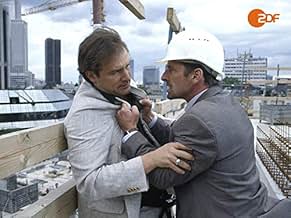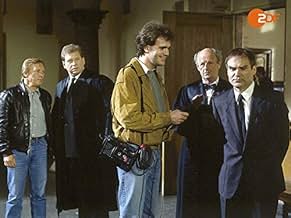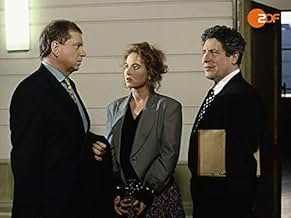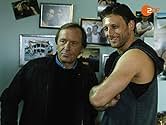CALIFICACIÓN DE IMDb
6.3/10
843
TU CALIFICACIÓN
Serie criminal alemana que gira en torno a abogados, un investigador privado y un exoficial de policía que se unen para exculpar a un cliente acusado de asesinato.Serie criminal alemana que gira en torno a abogados, un investigador privado y un exoficial de policía que se unen para exculpar a un cliente acusado de asesinato.Serie criminal alemana que gira en torno a abogados, un investigador privado y un exoficial de policía que se unen para exculpar a un cliente acusado de asesinato.
- Premios
- 2 premios ganados y 3 nominaciones
Explorar episodios
Argumento
¿Sabías que…?
- TriviaWhile the character of Josef Matula is mainly linked to Alfa Romeo cars, the lawyers are mainly Mercedes-Benz drivers. Dr. Dieter Renz used to drive a W114 and a W126 model. Dr. Johannes Voss drove a C208 CLK model. Dr. Markus Lessing always had sedans of the C-Class (W203 and W204 models, always in black). The exceptions are represented by Dr. Rainer Franck, who was a BMW 7 series driver (owned two E32 and one E38 model) and by two Opel Senator A used by Dr. Renz between the two Mercedes.
- ConexionesReferenced in Diese Drombuschs: Späte Einsicht (1990)
- Bandas sonorasTitle theme
Written by Klaus Doldinger
Opinión destacada
This is the classic German "buddy" crime series, which brings together two opposite personalities, the Lawyer and the Detective, to solve murders and acquit falsely accused suspects. The Lawyer was originally Strack's Dieter Rentz, a corpulent, cultured, highly professional and dedicated advocate and bon viveur, who dreaded only two things: steep stairways and having to drink cheap plonk out of a paper cup. The Detective was Gärtner's Josef Matula, a diminutive, jovial, leather jacket-wearing ex-cop who liked to have a beer and a pool cue at hand, when not sniffing around in the underworld, charming the ladies and smooth-talking himself into and out of tricky situations. Lawyers have since come and gone, but Matula has remained the show's constant, still charming, streetwise and mostly leather-jacketed at over sixty. At the same time, the original dynamic between protagonists has degraded, as successive Lawyers have become noticeably younger than Matula and almost as capable of physical action as he is. Still, a nice rapport has been established between Matula and the latest Lawyer, Frielinghaus' quietly charismatic Lessing.
The show's charm has lot to do with its comfortable sameness. While its look has had a few cosmetic (and rather unnecessary) updates in the 2000s, it still runs according to a familiar pattern. There is a crime, almost inevitably a murder. The Lawyer ends up representing the prime suspects who swear their innocence but are so miserly with truth that the Lawyer has to drag it out of them and fight to keep his clients from getting banged up without further ado. Matula does most of the legwork, often gets to hang around strip clubs or brothels (this is a German crime series, after all), sometimes gets roughed up a bit but eventually helps to uncover the truth. There has been an occasional downbeat ending, but generally the innocent client is saved and all turns out well.
When it began, the series brought a breath of fresh air, humour and vigour to the more civil-servant like matter-of-factness of many previous Krimis (as did Tatort's lovable lout detective Schimanski around the same time). Quarter of a century later it is quite mild and cosy a thing to watch, the television equivalent of comfortable old shoes. Its most iconic part is Klaus Doldinger's original theme music, an irresistibly jaunty synthesizer instrumental that was sacrilegiously remixed for the opening credits during the series' face-lift in the 2000s.
The show's charm has lot to do with its comfortable sameness. While its look has had a few cosmetic (and rather unnecessary) updates in the 2000s, it still runs according to a familiar pattern. There is a crime, almost inevitably a murder. The Lawyer ends up representing the prime suspects who swear their innocence but are so miserly with truth that the Lawyer has to drag it out of them and fight to keep his clients from getting banged up without further ado. Matula does most of the legwork, often gets to hang around strip clubs or brothels (this is a German crime series, after all), sometimes gets roughed up a bit but eventually helps to uncover the truth. There has been an occasional downbeat ending, but generally the innocent client is saved and all turns out well.
When it began, the series brought a breath of fresh air, humour and vigour to the more civil-servant like matter-of-factness of many previous Krimis (as did Tatort's lovable lout detective Schimanski around the same time). Quarter of a century later it is quite mild and cosy a thing to watch, the television equivalent of comfortable old shoes. Its most iconic part is Klaus Doldinger's original theme music, an irresistibly jaunty synthesizer instrumental that was sacrilegiously remixed for the opening credits during the series' face-lift in the 2000s.
- Yrmy
- 30 dic 2010
- Enlace permanente
Selecciones populares
Inicia sesión para calificar y agrega a la lista de videos para obtener recomendaciones personalizadas
- How many seasons does A Case for Two have?Con tecnología de Alexa
Detalles
- Fecha de lanzamiento
- País de origen
- Sitio oficial
- Idioma
- También se conoce como
- A Case for Two
- Locaciones de filmación
- Productoras
- Ver más créditos de la compañía en IMDbPro
- Tiempo de ejecución1 hora
- Color
- Relación de aspecto
- 1.78 : 1
- 16:9 HD
- 1.33 : 1
Contribuir a esta página
Sugiere una edición o agrega el contenido que falta

Principales brechas de datos
By what name was Un caso para dos (1981) officially released in Canada in English?
Responda



























